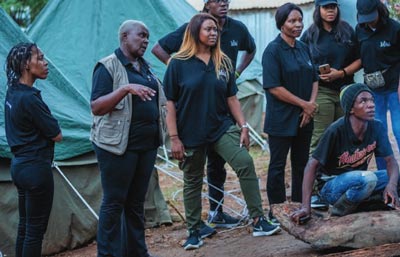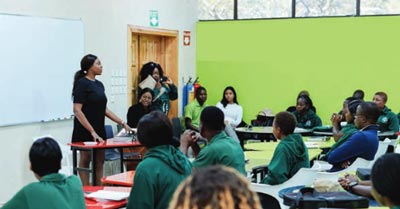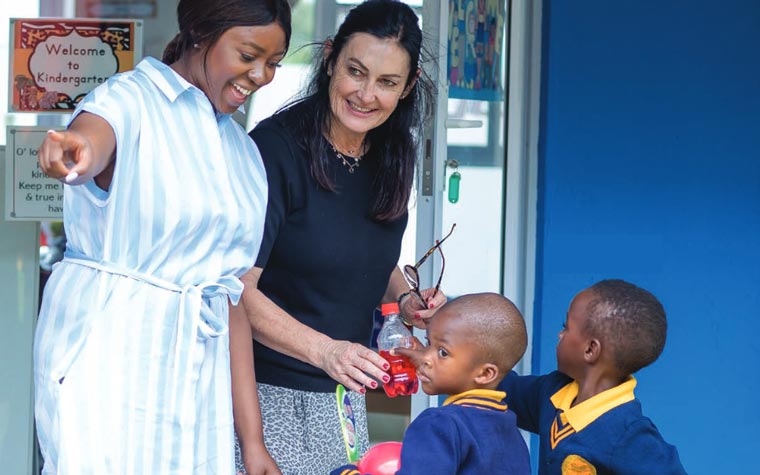Inspired by her family, Elizabeth Masiyiwa is commanding the fields of philanthropy and entrepreneurship
“I’m definitely not one of those people who has a good work-life balance,” Elizabeth (or Tanya, as she prefers to be called) Masiyiwa says, smiling. “But I absolutely enjoy it—nothing is more fulfilling than transforming lives.”
She is the eldest of six children born to her mother, a philanthropist, and her father, the founder and executive chairman of Econet Global, an international technology group with operations and investments around the world.
Equally devoting her time between business and philanthropy, Masiyiwa has adopted a similar work ethic to the one her parents modeled for her and her siblings.
Today, at 29 years old, Masiyiwa is a social entrepreneur in her own right.
“I had to figure out who I was,” she says frankly. “I didn’t want my father’s success to be my crutch.”
Masiyiwa is the co-founder and the CEO of Simba Education, a startup she developed during her postgraduate studies at Hult International Business School in San Francisco while pursuing a master’s degree in social entrepreneurship. She was one of the finalists of a startup accelerator competition for young social entrepreneurs—her project laid the groundwork for what would grow into a successful EdTech company that focuses on increasing access to early childhood education using technology.
“I charted my own path,” Masiyiwa says proudly. “I had to raise the money on my own. This has been one of my biggest accomplishments.”
Simba Education has evolved beyond software technology to include a brick-and-mortar school; Simba Preparatory School in Zimbabwe is an early years for-profit business, located in Domboshava, just outside Harare, the capital city.
The school, Masiyiwa explains, is a blueprint for other schools wishing to utilize technology in a rural environment. The team at Simba Education has also trained upward of 1,000 teachers in rural areas.
The Simba team has had to pivot as a result of the COVID-19 pandemic. It published a textbook based on the company’s educational software in order to guide parents teaching their children at home. Online lessons are being delivered via WhatsApp, as many students in rural areas do not have access to computers.
Virtual lessons are also shared with the 100 orphanages in Zimbabwe and are funded by the Masiyiwa family’s Higherlife Foundation, where Masiyiwa leads the Office of Design & Innovation and serves on the board.

Masiyiwa (third from left) during Cyclone Idai.
This year, Higherlife Foundation celebrates its 25th year in operation—a nonprofit, founded on the family’s Christian values and launched by Masiyiwa’s parents in 1996. It is a social impact organization that invests in human capital development to build sustainable livelihoods and communities. Over the years, the foundation has grown to fund scholarships for over 350,000 orphaned and vulnerable children in each of Zimbabwe’s 10 provinces as well as in Lesotho and Burundi.
“After experiencing the fallout of the HIV/AIDS pandemic and seeing the huge losses, my mom made a personal commitment to look after orphaned children in Zimbabwe who had lost their parents to HIV/AIDS,” Masiyiwa explains.
According to her, giving has always been “a normal family thing.” Her parents are signatories of the Giving Pledge, and have demonstrated their promise—to give away the majority of their wealth during their lifetime—many times over.
They made sure their children were involved as well. Growing up, it was normal for Masiyiwa to go to a local orphanage with her mother on weekends. They would play with the children, share a meal, sleep over, and then return home the next day.
“Every conversation around our dinner table has always been about giving back,” Masiyiwa says. “My father would tell us as kids that we have a responsibility to be stewards.”
Masiyiwa, who was born in Zimbabwe, was seven years old when the family relocated to Johannesburg after experiencing ongoing issues with the Zimbabwe government around licensing for her father’s telecommunications company. The move was an adjustment for the family.
“We shifted from a place where it’s normal to see someone who looks like yourself running a company to a place where people of color are just starting to get on their feet,” Masiyiwa remembers. When the COVID-19 pandemic hit, the family decided that it was best to ride it out together in London, their home base, and where Masiyiwa had moved to to pursue an undergraduate degree. Without his usual support staff, Masiyiwa and her siblings decided to work with their father, who is Special Envoy of the African Union, to assist with securing procurement for medical supplies and vaccinations to help halt the spread of COVID-19 on the continent.
Prior to joining Higherlife Foundation full time, Masiyiwa worked in New York as an analyst for UNICEF’s Venture Fund. After participating in the NEXUS Global Summit and becoming more aware of her family’s net worth, her career trajectory changed. She left UNICEF to work at Higherlife Foundation, splitting her time between Johannesburg, London, and Harare.
Since Masiyiwa’s increased involvement with the foundation, the family decided to become involved in bolder philanthropy. It founded Delta Philanthropies, a U.K.-based charity with projects being co-created, designed, and implemented alongside Higherlife Foundation. Masiyiwa is the executive director at Delta Philanthropies, where her experience is put to good use. Delta’s areas of focus include providing quality education from degrees in early childhood development to Ph.D. level, strengthening health systems and eliminating preventable diseases, transforming rural communities to be more sustainable, and facilitating networks for emergency response initiatives in “disaster relief and prepared- ness.”

Masiyiwa speaking during a STAR session.
Masiyiwa is also the co-founder and director of STAR Leadership Academy, an intensive education and experiential learning program that recruits gifted students with the hope of creating the next generation of African leaders in government, business, and philanthropy. She serves on the board of Cassava Smartech, one of the larger companies under the Econet Global umbrella—its mandate is to use digital solutions to drive socioeconomic development and to improve the quality of life for all Africans. Masiyiwa sits on the Leadership Council of the Harvard Center for African Studies and she’s extremely proud to be a member of Harambean, a business network of young African entrepreneurs.
Masiyiwa’s latest philanthropic commitment is serving as a trustee at the Africa Center, located on Museum Mile in New York City. Under the leadership of co-chairs Chelsea Clinton, Jendayi Frazer, and the board’s president, Halima Aliko Dangote, the center is a cultural hub that “provides a gateway for engagement with contemporary Africa.”
Over the next five years, Masiyiwa plans to take on a bigger role in the family business, focusing on transitioning the company to make sure it continues growing. Her dedication to Zimbabwe, and that of her family’s, has and will always be a priority in their giving plans. They have unveiled a vision that drives their work—“Vision 2050”—a unified effort and initiative to make Zimbabwe and other African countries achieve upper-middle-income status by 2050.
“We see ourselves as a collective movement to inspire others and be a catalyst for change,” Masiyiwa says, smiling with the confidence of a woman who is changing the world.
This article by Rena Godfrey appeared in the Summer 2021 issue of Lifestyles Magazine.
Photos: Stabile Mbengesi, Tatenda Mapigoti
